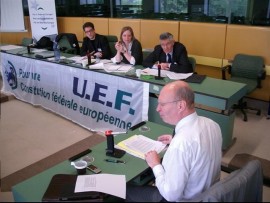
Some interesting discussions at the weekend at a meeting of the UEF, Federal Union’s European parent body. Participants from all over Europe were gathering to talk about some of the current issues facing the EU, including foreign policy and the financial crisis.
On foreign and security policy, we were asked whether there was indeed a common European interest, if so to which countries it applied, and whether it superseded national interests in this field.
My view was that, yes, there is a common European security interest. Whether the threat is Islamist terrorism, or a suspension of Russian gas supplies, or something else we have not yet thought of, European countries are now so integrated economically and socially that a threat to one will have adverse consequences for the others.
And even if, in the unlikely event that a security problem befalls one country alone and no others are affected, there is still a common interest in providing assistance. A fundamental principle behind the creation of the European Union in the first place was the idea of a shared mutual solidarity amongst its members. The Union is not merely an economic arrangement but is something more important than this.
In which case, the question of to whom the shared interest applies is easily answered: it is those countries that have voluntarily accepted these obligations towards each other. The EU has 27 member states at present, and the ambition of extending that shared mutual solidarity is a good reason why that number of 27 should grow.
On the point about European and national interests, I think that the traditional notion that foreign policy should be an exclusive federal competence is wrong. The point of a foreign policy is for a government to explain its views to other governments. This is something that lower levels of government might well wish to do alongside the federal level. There are in London at present representative offices of the Canadian province of Quebec and the Australian state of Queensland, for example. The development of a European foreign policy does not mean the end of a role for member state foreign policies and embassies around the world.
On the issue of the financial crisis, there were two main themes. The first, which is well-known within federalist circles, was the need for effective action by the EU rather than ineffective action by the individual member states. The second, which was controversial at the meeting, was the question of whether the rules for membership of the euro should be changed. The current convergence criteria were laid down in the Maastricht treaty in 1992, but there are good reasons to rethink them now.
Both the Maastricht treaty and its close cousin, the Stability and Growth Pact, were written for normal times. Their purpose was to ensure that no eurozone member state caused a crisis that then spread to other member states, and in that task they have succeeded. (The crisis, as Gordon Brown likes to remind us, started in America.) But the point is that the crisis has already started – we are not in normal times – and the aim now should be to manage and bring to an end the current crisis rather than worry immediately about preventing the next one.
In that light, membership of the euro is one of the key tools that many European countries would find useful in dealing with their economic problems. They should not be denied the use of that tool by rules that were written for another era. A large and dysfunctional economy like that of the UK will find it hard to join the euro soon, but the same obstacles do not stand in the way of smaller countries such as Iceland or Hungary.
The controversy arises because, in some countries, the terms of the convergence criteria and the Stability and Growth Pact were hard-fought and even revered. But times are changing, and Europe must change with them.
